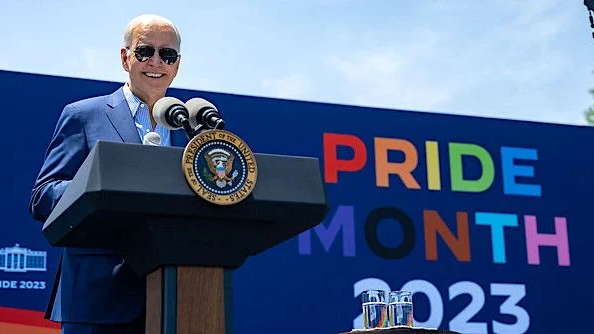On June 10, 2023, President Joe Biden delivered remarks during a Pride celebration on the South Lawn of the White House, two years after enacting the Respect for Marriage Act. This act, celebrated by Biden as a significant civil rights achievement, was primarily a legislative change that substituted the terms “man” and “woman” with “individuals” to redefine marriage under federal law. The essence of the legislation pertains to the recognition of same-sex and interracial marriages, affirming that any marriage deemed valid under state law should be recognized federally. However, it largely reiterated conclusions from previous Supreme Court rulings, such as United States v. Windsor in 2013, which deemed the traditional definition of marriage unconstitutional, and Obergefell v. Hodges in 2015, which further solidified the right to same-sex marriage.
Biden’s portrayal of the Respect for Marriage Act as a transformative law overlooks the historical context in which same-sex marriage was already established and is currently legal across the United States. The Act not only protects these marriages but also prohibits states from denying recognition of such unions conducted in other states, irrespective of sex, race, ethnicity, or national origin. Additionally, the act enshrines the rights of individuals to take civil action in cases of violation. However, the President’s focus on the legislation has provoked criticism regarding the motivations and priority of his administration, with opponents arguing that Biden has prioritized LGBTQ issues at the expense of addressing pressing social concerns like immigration, crime, and inflation.
The legislative changes signaled a broader cultural push by the Democratic Party, aimed at advancing a narrative of inclusivity and equality. Critics have suggested that the Democrats’ drive for inclusion has gone too far in seeking to remove traditional definitions of gender and marriage from legal discourse. This sentiment is exemplified through remarks made by other party members, including a recent claim by Democratic gubernatorial nominee Tim Walz, who erroneously suggested that same-sex marriage remained illegal in Nebraska—a claim directly contradicted by federal law. The miscommunication illustrates a disconnect not only within the party but also raises questions about the implications and understanding of the Respect for Marriage Act’s practical impact on American families and social structures.
While the Respect for Marriage Act is positioned within a framework of civil rights, it also underscores the complexities that arise when advocating for equality among various identities. Critics of the legislation argue that the focus on expanding definitions of marriage and dismantling traditional gender norms detracts from meaningful dialogues about religious liberties and the social fabric of American life. This push toward inclusivity has spurred resistance from conservative factions that view the action as a direct challenge to established beliefs about marriage and gender, thus igniting broader debates about the intersection of law, personal beliefs, and societal standards.
Amidst this backdrop, Biden’s administration has faced scrutiny over its priorities. Supporters assert that advancing LGBTQ rights is a fundamental component of a just society, while detractors contend that Biden has overlooked more immediate concerns faced by everyday Americans. Questions linger as to how these legislative actions will affect the public’s trust in the government to address pressing national issues effectively. The celebration of LGBTQ rights reinvigorated by the Respect for Marriage Act is interpreted by some as a distraction from more critical socio-economic challenges that had been exacerbated during Biden’s tenure.
As Biden plans for the future, the administration’s focus on LGBTQ issues and the respective legislative measures may continue to shape its legacy. While two years post-Respect for Marriage Act finds the President reaffirming his commitment to marriage equality, it also raises broader reflections on how societal values are interpreted and legislated. The path forward will likely involve continued discussions about balancing progression in civil rights with preserving traditional values, all while recognizing the ongoing need to address the urgent issues affecting the American populace. These discussions may influence Biden’s pledges moving forward, particularly as he navigates the complex dynamics between evolving civil rights and the preconceived notions surrounding marriage and identity in contemporary society.

